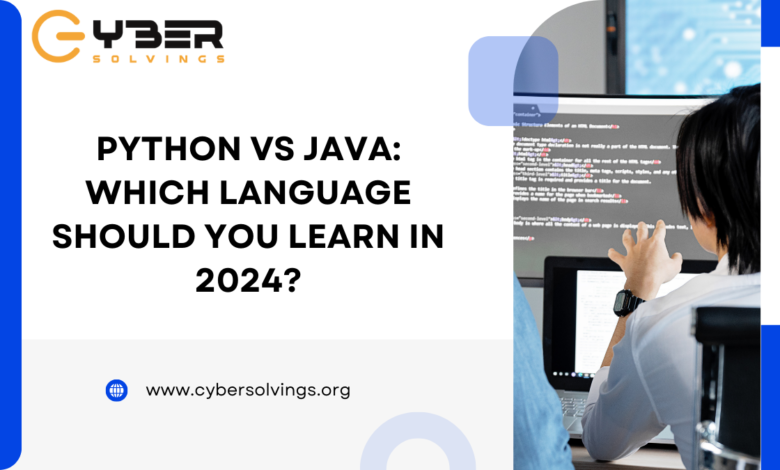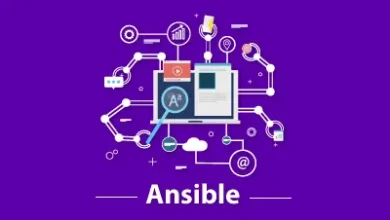Python vs Java: Which Language Should You Learn in 2024?

Choosing the right programming language can be a daunting task, especially in a rapidly evolving field like software development. Python and Java are two of the most widely-used languages, but which one is right for you in 2024? In this guide, we’ll break down the strengths and weaknesses of both languages like Python vs Java to help you make an informed decision. And if you’re interested in getting serious with your learning, you can even explore comprehensive programming courses on Cybersolvings!
What Are Python and Java?
Let’s start by understanding what Python and Java are. Both are high-level, object-oriented programming languages, but they have different areas of strength.
Python is known for its simplicity and readability, making it an excellent choice for beginners. It’s used in everything from web development to data science, automation, and artificial intelligence.
Java, on the other hand, is a more rigid language that has been the backbone of large-scale enterprise applications for decades. It’s robust, fast, and secure, with a focus on scalability.
Python: The User-Friendly Powerhouse
Python has skyrocketed in popularity over the last decade, and its growth is showing no signs of slowing down in 2024. One of the biggest reasons is its simple syntax. Python code reads almost like English, which makes it an ideal language for people just getting started in programming. You don’t need a computer science background to pick it up quickly.
Python’s versatility is another strong selling point. Whether you want to build a website, automate repetitive tasks, or dive into data science, Python has frameworks and libraries that can help. Popular frameworks like Django and Flask make it a go-to language for web developers. Meanwhile, libraries like Pandas and NumPy are essential tools for anyone entering data analytics or machine learning.
Java: The Sturdy Backbone of Enterprise Development
Java might not be the trendiest language, but it’s one of the most reliable. In 2024, Java remains essential for large-scale enterprise applications. Its object-oriented nature, along with strong performance and scalability, makes it perfect for projects that need to handle high loads and complex operations.
If you’re aiming for a career in Android development, Java is a must-learn language. Although Kotlin is gaining popularity in mobile development, Java is still widely used for Android apps and legacy systems.
Learning Curve: Python vs Java
When it comes to ease of learning, Python takes the crown. Its clean syntax means you can start writing useful code within hours of learning. Beginners often find that Python allows them to focus on solving problems rather than getting bogged down by complicated syntax.
Java, however, can be more challenging to grasp initially. Java is strongly typed, meaning that you need to define the type of every variable before using it. While this adds a layer of complexity, it also enforces better programming practices that are beneficial as you move into more advanced projects.
Job Market and Salary: Python vs Java
If you’re learning a new language in 2024 with the goal of landing a job, both Python and Java offer solid opportunities.
Python is dominating fields like data science, machine learning, and automation, which are growing rapidly. Its presence in web development is also strong, thanks to frameworks like Django. Python developers are in high demand, especially as companies continue to invest in AI and machine learning.
On the other hand, Java developers are still sought after, particularly for roles in enterprise environments. If you’re targeting positions in Android development or large-scale systems architecture, Java skills will make you highly competitive.
When it comes to salary, both languages offer lucrative opportunities, but Python developers often earn slightly more due to the high demand in specialized fields like AI.
Popularity and Community Support
Python’s community has grown rapidly, with extensive documentation and open-source projects available. No matter what issue you face, chances are someone has already solved it and shared the solution online. Python’s community is particularly strong in data science and web development, making it easier for you to get help or collaborate on projects.
Java has a mature and established community, which is highly beneficial if you’re working on enterprise-level applications. Java’s vast ecosystem includes a wide range of tools, frameworks, and support for tackling almost any problem. Open-source projects are abundant, especially in areas like server-side development.
Performance and Speed: Python vs Java
When it comes to performance, Java generally outpaces Python. Java is compiled into bytecode and runs on the Java Virtual Machine (JVM), making it faster for applications that require high performance, such as enterprise systems or Android apps.
Python, while slower, is often fast enough for many applications. It is interpreted at runtime, which makes it more flexible but also slower than Java in scenarios where speed is critical. However, Python’s performance can be enhanced with tools like Cython or by integrating faster libraries for specific tasks.
Best for Web Development
Python is a favorite among web developers, thanks to frameworks like Django and Flask, which simplify the process of building web applications. The Django framework, in particular, is known for its security features, scalability, and ease of use.
Java can also be used for web development, though it’s more commonly found in enterprise-level systems using frameworks like Spring. Java’s Spring Boot is a powerful tool for building scalable web services, but it requires more setup and a steeper learning curve than Django.
Best for Mobile App Development
When it comes to mobile development, Java is the king of Android development. Most Android apps have been built using Java, and even though Kotlin is now the preferred language for Android, Java skills are still essential for maintaining and improving existing apps.
Python is not as widely used in mobile development, but there are frameworks like Kivy and BeeWare that allow developers to create mobile apps in Python. However, these frameworks are not as mature or powerful as Java’s Android development ecosystem.
Best for Data Science and AI
If you’re looking to get into data science or machine learning, Python is the undisputed leader. Its vast array of libraries, such as TensorFlow, Keras, and Scikit-learn, make it easy to work with data, train models, and deploy AI applications. Python’s dominance in data science is one of the reasons it’s so popular among beginners and experts alike.
Java, while not as dominant in AI, is still used in big data environments. Tools like Apache Hadoop and Apache Spark are often coded in Java, making it relevant for enterprise -level big data solutions. However, Python’s simplicity and vast library ecosystem give it the edge when it comes to working with AI and machine learning applications.
Cross-Platform Compatibility
One of Java’s strongest selling points has always been its “write once, run anywhere” philosophy. Java applications can run on any device or operating system that supports the Java Virtual Machine (JVM), making it ideal for projects that require cross-platform compatibility. This is one reason why Java remains so prevalent in enterprise environments where diverse hardware and operating systems are involved.
Python also offers cross-platform support, though it’s not as seamless as Java. Python’s flexibility allows developers to write code that runs on different operating systems, but sometimes platform-specific adjustments are necessary, especially when dealing with low-level system tasks or GUIs.
Security Features
When it comes to security, both Python and Java have strong built-in features, but they excel in different areas.
Python, due to its simplicity and readable code, is generally considered easier to maintain, reducing the likelihood of introducing bugs that could lead to security vulnerabilities. It also has secure frameworks like Django, which comes with built-in protection against common vulnerabilities like cross-site scripting (XSS) and SQL injection. However, Python’s flexibility can sometimes lead to less structured code, which might expose applications to risks if not managed carefully.
Java, with its rigorous type system and object-oriented nature, is designed for long-term stability and security. It’s particularly known for its robust security manager, which helps control what code can and cannot do in an application. Java also provides strong memory management and is frequently updated with security patches, making it a safe choice for enterprise environments.
Which Language is More Future-Proof?
In terms of longevity, both Python and Java have bright futures, but they may thrive in different sectors.
Python’s future looks particularly strong in the realms of AI, machine learning, and data science. Its use in educational environments and its ever-growing collection of libraries make it a great choice for students and professionals entering emerging fields like automation and AI development. Python’s ease of use also makes it highly adaptable to new technologies, meaning it is well-positioned to remain relevant for years to come.
Java’s future lies in its continued dominance in enterprise-level applications, cloud computing, and Android development. It’s a mature language that powers much of the world’s business software, from financial systems to large-scale web applications. As long as enterprises continue to rely on large-scale systems and Android remains a key mobile platform, Java will maintain its place in the software development ecosystem.
Conclusion: Which Should You Learn in 2024?
So, which language should you learn in 2024? The answer depends largely on your career goals and interests.
- If you’re interested in data science, AI, or web development, Python is likely the best choice. Its simplicity, readability, and vast library support make it an excellent entry point for beginners, and its versatility ensures you can apply your skills across a range of industries.
- On the other hand, if you’re targeting enterprise development, large-scale systems, or Android app development, Java is the language for you. Its scalability, performance, and widespread use in enterprise environments make it ideal for anyone looking to work on robust, high-performance applications.
Ultimately, both languages are valuable to learn, and each has its own strengths. If you have the time and ambition, learning both Python vs Java will give you a well-rounded skill set that makes you highly competitive in the job market. And if you’re ready to dive in, consider taking a course with Cybersolvings to guide you through the learning process!





